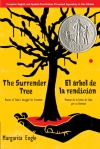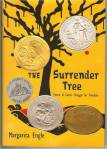
The Higher Power of Lucky, by Susan Patron
Many of the Newbery books have seemed to me to be written a little over the heads, perhaps, of the intended audience. Or maybe they just seemed too serious for kids to enjoy. The Higher Power of Lucky is a strange exception to that rule. Strange, because my general impression of Lucky was that it was a light-hearted, fun book. But when I think about the plot — little girl’s mother dies, her father is so uninterested in her that he gets an old friend to look after her, then never sends enough money for them to get by on — oh, and add one friend whose mother is in jail, and another who has a neurotic rope tying obsession, as well as a town full of folks who live on government food subsidies and spend a lot of time at AA meetings, and you have one book that’s very light-hearted indeed. Really. It was funny. And yet, I kept thinking maybe I shouldn’t be laughing at this.
I was starting to think I need to hook into Susan Patron and ask her how she meant the book to be read. But then I ran across this New York Times article and realized I wasn’t alone in my confusion. Remember — I really liked this book. I’m just not sure who the audience was meant to be. The protagonist is ten, and the generally accepted wisdom is that kids like to read books about characters who are older than them, but tend to avoid books about characters who are younger. But this book was clearly not written for 8-year olds.
And then there’s the censorship controversy.
Really. I think people need to stop getting their panties all in a wad about things like this. If people actually read the entire book instead of getting stuck on the word scrotum on page one, they might be reminded that all over the United States there are, in fact, people living on government food subsidies, and kids who are trying to get by without any real adult involvement in their lives. In other words, they might discover that there are far more important issues in the world today than whether fourth and fifth graders learn the actual official name of an awkward male body part, instead of just calling it by one of the far more interesting slang words they already know.
Sigh.
Meanwhile, food service workers are protesting the minimum wage, and a teenager I know just blasted that whole movement on his Facebook page. Basically, he thinks they should just suck it up and get better jobs. Because somebody has told him it’s just that easy and he hasn’t seen enough of the world to know better. Sadly, instead of reaching out to the working poor and trying to help them, we have become a country that gives tax breaks to the rich, and vilifies the poor. And our kids are starting to think that’s okay.
So if you’re one of the folks who got all excited about the whole scrotum thing, try putting all that energy toward a more worthy cause, and leave your kids alone if they want to read this book. Maybe they’ll learn something
The Higher Power of Lucky, by Susan Patron; Narrated by Cassandra Campbell
Newbery Medal – 2007
A.R. Level: 5.9; Middle Grades









